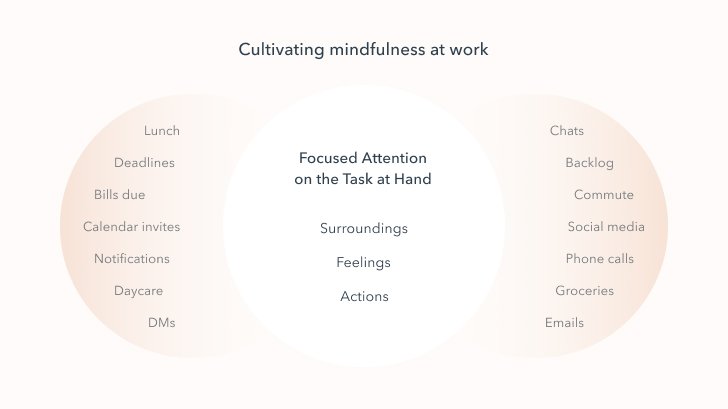THE BENEFITS OF MINDFULNESS IN BUSINESS: HOW TO CULTIVATE A CALM AND FOCUSED MINDSET
Unlocking the Power of the Mind: The Surprising Benefits of Mindfulness in Business” – Discover how cultivating a calm and focused mindset through mindfulness can revolutionize your professional life.
KEY TAKEAWAYS
- Mindfulness assists individuals in being calm and focused, leading to increased productivity and sound business judgment.
- Employees’ stress levels may be reduced, and their general well-being may be improved through mindfulness practices.
- The workplace may improve collaboration and dialogue amongst colleagues by including mindfulness.
- Mindfulness may help individuals develop higher emotional intelligence, improving interactions with colleagues and customers.
- Mindfulness practices may improve workplace creativity and innovation.
- Increased mental toughness and the ability to deal with uncertainty and change in the workplace are two positive outcomes of cultivating a mindfulness practice. In addition, Mindfulness may help individuals become more resilient.
- Frequent mindfulness practice has long-term advantages for individuals and companies, including higher work satisfaction and retention.
INTRODUCTION
More and more businesses have realized the benefits of mindfulness for employee well-being and business performance in recent years. So what is mindfulness, and why is it crucial in the workplace? In this post, we’ll look at the definition of mindfulness, how it applies to business, and the many benefits it may provide.
A state of mindfulness is one in which one pays full, unrestricted attention to the here and now. It entails paying undivided attention to one’s internal and external experiences while fully aware of one’s thoughts, emotions, and surroundings. Mindfulness is often linked to meditation techniques, although it may also be developed via more mundane means, such as attentive breathing or mindful eating.

Photo: Calm
Mindfulness is a crucial technique for assisting professionals in being focused, productive, and resilient in today’s fast-paced and stressful business world. Individuals may learn to control their stress, lessen their anxiety, and enhance their general emotional and mental health by engaging in mindfulness practices. This may lead to more originality, better judgment, and stronger relationships with colleagues and customers.
The benefits of mindfulness in business are vast and diverse. Among the most prominent are:
- Mindfulness training helps individuals remain present and focused on the job, minimizing distractions and boosting productivity.
- Mindfulness may help individuals handle stress more effectively and lessen the harmful consequences of stress on the body and mind.
- Mindfulness helps individuals become more aware of and better control their emotions, leading to stronger emotional intelligence and better relationships with colleagues and clients.
- Individuals may make better, more knowledgeable judgments in the workplace if they are present and aware of their thoughts and emotions.
- Stronger relationships: Mindfulness may enhance communication skills, empathy, and general relationships with colleagues and clients, leading to a more pleasant and cooperative work environment.
- Improved overall well-being: Mindfulness practice may lead to greater physical, mental, and emotional well-being, leading to higher job satisfaction and overall success in the workplace.
BENEFITS OF MINDFULNESS
For individuals and companies, mindfulness, or the discipline of being completely present at the moment, offers several advantages. The main advantages of mindfulness in the workplace will be discussed in this section.
- increases concentration and productivity
Mindfulness has been found to increase concentration and productivity. By practicing mindfulness, individuals can better block out distractions and remain focused on the job at hand. In addition, individuals may maintain vitality and enthusiasm for shifts by practicing mindfulness. Take brief mindfulness breaks, practicing mindfulness breathing, and establishing daily mindfulness objectives are all effective methods for incorporating mindfulness into one’s everyday work routine.
- Stress and Anxiety are Decreased
Workplace stress and anxiety are pervasive and detrimental to productivity at all levels. Thankfully, mindfulness is an efficient method for lowering stress and anxiety. By practicing mindfulness, individuals may improve their ability to control their thoughts and emotions, as well as their feeling of resilience and serenity. Mindfulness meditation, mindful breaks throughout the day, and mindful movement techniques like yoga and tai chi are all effective methods for incorporating mindfulness into existing stress management routines.
- Improved Innovation and Creativity

Photo: Calm
Mindfulness has been demonstrated to boost creativity and innovation by encouraging open-mindedness and lowering cognitive rigidity. In addition, individuals may strengthen their connection to their inner wisdom and original ideas with mindfulness. Mindfulness exercises to warm up the brain, practicing mindful listening, and fostering mindful reflection are all strategies for incorporating mindfulness into brainstorming and ideation sessions.
- Collaboration and communication have improved.
The success of every company depends on effective communication and collaboration. By encouraging increased empathy and understanding, lowering conflict, and boosting the quality of interpersonal interactions, mindfulness has been found to promote communication and collaboration. Practicing mindfulness, employing mindfulness exercises to foster trust and empathy, and practicing mindful listening and feedback are all strategies for incorporating mindfulness into team-building activities and meetings.
Businesses may benefit from the various advantages of mindfulness by incorporating it into their regular operations and procedures. In addition, Mindfulness may help individuals and organizations flourish
in today’s fast-paced and ever-changing work environment, from increased attention and productivity to decreased stress and anxiety, increased creativity and collaboration, and greater mindfulness and communication.
HOW TO CULTIVATE A CALM AND FOCUSED MINDSET
Maintaining a calm and focused attitude in today’s fast-paced, high-stress corporate environment might be difficult. However, there are several advantages to mindfulness practice for business workers who will look at mindfulness practices that may help you cultivate a calm and focused outlook.
- Focus and productivity are improved: Mindfulness practices help boost concentration and productivity by reducing distractions and improving addition and techniques. Techniques like mindful breathing and meditation help you focus and clear your mind, leading to higher productivity.
- Mindfulness practices may help decrease stress and anxiety by encouraging relaxation and reducing the harmful effects of stress on the body. According to research, the stress hormone cortisol and anxiety symptoms may be reduced by mindfulness.
- Mindfulness practices help boost creativity and innovation by encouraging open-mindedness and reducing mental obstacles. Mindful awareness may help individuals look at problems differently and develop novel solutions.
- Mindfulness practices enhance collaboration and communication by improving empathy and reducing emotional reactivity. Individuals may become more responsive to the needs and views of others by practicing mindfulness, leading to improved communication and cooperation.
A calm and focused mindset can be cultivated by:
- Focusing on the here and now while detachedly watching one’s mental processes is the essence of mindfulness meditation. This method may be practiced via guided meditations or sitting quietly and concentrating on the breath. This may be done anytime and can help individuals calm their brains and lessen stress.
- Yoga, Tai Chi, and Qigong are mindful movement practices focusing on the body’s motions and sensations. These practices help individuals become more aware of their bodies and lessen stress and tension.
- Mindfulness is the practice of paying attention to the here and now and being more aware of one’s inner mental and emotional states without passing judgment.
In sum, there are many ways in which the practice of mindfulness may help those working in the business world. By incorporating mindfulness practices like meditation, breathing exercises, mindful movement, and mindfulness awareness into daily routines, individuals can cultivate a calm and focused mindset, improving focus, reducing stress, increasing creativity, and improving communication and collaboration.
CONCLUSION
Mindfulness practices may be a potent tool for success as businesses face the difficulties of the contemporary world. Mindfulness offers several benefits for businesspeople at all levels, including increased concentration and output and decreased worry and stress.
Including mindfulness practices in everyday activities are important to create a peaceful and focused mentality properly. These may involve mindfulness meditation, breathing exercises, physical practices, and awareness approaches.
Incorporating mindfulness practices may result in happier, healthier, and more productive business staff. In addition, organizations may create a more pleasant and supportive atmosphere that supports development and creativity by establishing a culture of mindfulness and incorporating these practices throughout the workplace.
Going into the future, it is certain that mindfulness will continue to play an important role in the economic sector. We anticipate a greater focus on mindfulness training, retreats, and other activities to promote employee well-being and success as more organizations realize the benefits of these practices. As a result, businesses may remain ahead of the curve and succeed in an increasingly competitive market by embracing these trends and adopting mindfulness practices into their operations.


































Comment Template